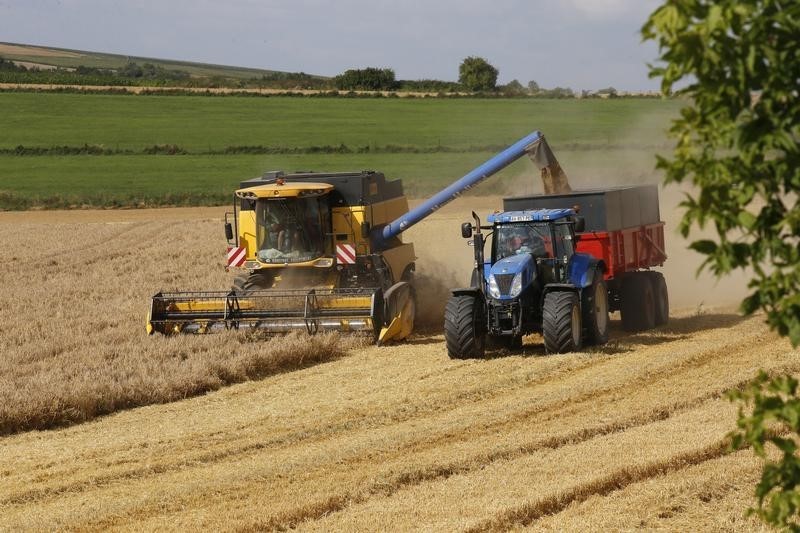(Bloomberg) -- Headquartered in a nondescript office building in Washington, the U.S. Department of Agriculture’s Economic Research Service churns out papers with such scintillating titles as “Cotton and Wool Outlook: September 2019.” The ERS, as it’s often called, is the kind of government bureaucracy few can identify but millions rely on for their livelihoods.
With roots dating to President Theodore Roosevelt’s administration, the agency provides the informational lifeblood of the nation’s $1 trillion agricultural industry. Its research informs the World Agricultural Supply and Demand Estimates, or WASDE, arguably the most important global report of its kind for farmers and investors. Congress uses ERS forecasts to determine how much farm subsidies will cost taxpayers.
Yet today, this key organization has been gutted. As of the end of September, three-quarters of its staff of 250 have retired, quit, were terminated, or plan to leave by year-end, according to internal estimates compiled by staff and their union that were viewed by Bloomberg News, and interviews with 12 current and former employees.
The unit is a casualty of last year’s decision by Donald Trump’s administration to move part of the USDA, including the ERS, from Washington to the Kansas City region. U.S. Agriculture Secretary Sonny Perdue said it would save money and bring the organization closer geographically to the industry it supports. Perdue has said he wanted all employees to transfer, though he knew some wouldn’t for family reasons.
The USDA declined to discuss the number of departures but cautioned that employment figures are “changing daily,” since the staff has until Friday to decide whether to take a position outside Washington. In a statement, the department said the move will increase, not reduce, research because the $20 million in anticipated annual cost savings can be used to retain and attract staff. The agency said the move will have no impact on the closely followed WASDE reports.
But Susan Offutt, former ERS administrator and previously chief economist at the U.S. Government Accountability Office, Congress’s watchdog arm, said the move aims to eliminate researchers whose findings contradict Trump policies on tariffs, climate change and social programs. “The ERS research program produces output that is inconvenient” to the administration, she said.
Last year, for example, two ERS economists found that, among farmers, the Trump tax cuts primarily benefited the richest operators. Later, after the results were reported in the press, the USDA communications office instructed the researchers not to speak publicly, and the Office of the Chief Economist asked them to craft talking points discrediting their own research, people familiar with the conversations said. The USDA declined to discuss the situation.
Those who rely on the data are feeling mounting concern that reports will either be skewed or not produced at all.
Richard Oswald farms more than 2,000 acres of corn and soybeans near the northwestern Missouri city of Rock Port, population 1,200. Amid the wettest spring on record, the nearby Missouri River has been flooding as a result of climate change, threatening a business that has sustained his family here for 80 years. Oswald, 69, looks to ERS reports to build a case for improving bridges and river levees.
“If you can’t talk about climate change, the reason this is happening, then how can you even talk about changing it?,” said Oswald, a board member of the Missouri Farmers Union. “It’s about policy makers, farmers, people who live in the cities -- this is unbiased work that has been done for years. The effort is to slow it down, and that’s what the move has done -- slowed down reporting on climate and the signs.”
Some reports from the ERS, which also focuses on rural America and trade, have already been delayed. These include research on politically sensitive areas such as the causes of the opioid epidemic, market access under tariff rate quotas and U.S. agricultural exports to China. The reason: A group of seven staff who edit the peer-reviewed reports is down to one, causing a backlog.
At the resource and rural economics division, which studies links between agriculture, energy, climate and policies, at least half of its staff of about 65 have already left or will be leaving when the agency moves its headquarters, according to the internal estimates viewed by Bloomberg.
The food team retained only half its staff of 55. The group analyzes areas essential to U.S. well-being: school lunch programs, regular reports on the health of women and children, and food safety and prices. Similarly, half of the researchers compiling the U.S. government’s most detailed report on farm and ranch finances are gone. All five people responsible for farm insurance and risk management have left.
On a recent weekday afternoon at ERS headquarters just south of the Capitol building, rows of chairs and desks stand empty, as if employees had just fled an earthquake, leaving behind coffee-stained mugs and stacks of documents in the hallways, according to a current staffer who asked not to be identified because of a lack of authorization. Entire sections of the office are in darkness since there’s no one to activate the motion sensor lights. On a wall, remaining staff post the names of those who’ve left on sticky notes: RIP for Retired in Peace. QIP for Quit in Peace.
“Without the information, you don’t have anything to inform your policy -- and information is changing as you and I are speaking,” said Katherine Wallman, chief statistician of the U.S. under four presidents until 2017. “It’s the worst possible time to cut the availability of that information.”
